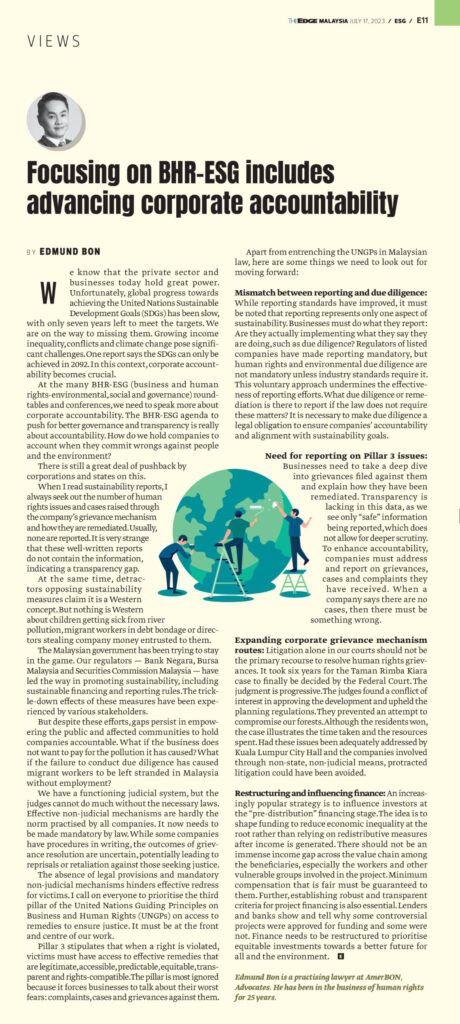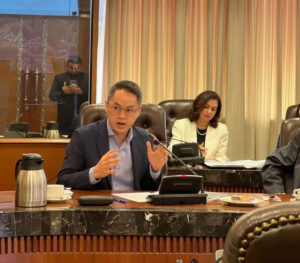
We know that the private sector and businesses today hold great power. Unfortunately, global progress towards achieving the United Nations Sustainable Development Goals (SDGs) has been slow, with only seven years left to meet the targets. We are on the way to missing them. Growing income inequality, conflicts, and climate change pose significant challenges. One report says the SDGs can only be achieved in 2092. In this context, corporate accountability becomes crucial.
At the many BHR-ESG (business and human rights-environmental, social, and governance) roundtables and conferences, we need to speak more about corporate accountability. The BHR-ESG agenda to push for better governance and transparency is really about accountability. How do we hold companies to account when they commit wrongs against people and the environment?
There is still a great deal of pushback by corporations and states on this.
When I read sustainability reports, I always seek out the number of human rights issues and cases raised through the company’s grievance mechanism and how they were remediated. Usually, none are reported. It is very strange that these well-written reports do not contain the information, indicating a transparency gap.
At the same time, detractors opposing sustainability measures claim it is a Western concept. But nothing is Western about children getting sick from river pollution, migrant workers in debt bondage, or directors stealing company money entrusted to them.
The Malaysian government has been trying to stay in the game. Our regulators — Bank Negara, Bursa Malaysia, and Securities Commission Malaysia — have led the way in promoting sustainability, including sustainable financing and reporting rules. The trickle-down effects of these measures have been experienced by various stakeholders.
But despite these efforts, gaps persist in empowering the public and affected communities to hold companies accountable. What if the business does not want to pay for the pollution it has caused? What if the failure to conduct due diligence has caused migrant workers to be left stranded in Malaysia without employment?
We have a functioning judicial system, but the judges cannot do much without the necessary laws. Effective non-judicial mechanisms are hardly the norm practised by all companies. It now needs to be made mandatory by law. While some companies have procedures in writing, the outcomes of grievance resolution are uncertain, potentially leading to reprisals or retaliation against those seeking justice.
The absence of legal provisions and mandatory non-judicial mechanisms hinders effective redress for victims. I call on everyone to prioritise the third pillar of the United Nations Guiding Principles on Business and Human Rights (UNGPs) — access to remedy — to ensure justice. It must be at the front and centre of our work.
Pillar 3 stipulates that when a right is violated, victims must have access to effective remedies that are legitimate, accessible, predictable, equitable, transparent, and rights-compatible. The pillar is most ignored because it forces businesses to talk about their worst fears: complaints, cases, and grievances against them.
Apart from entrenching the UNGPs in Malaysian law, here are some things we need to look out for moving forward:
Mismatch between reporting and due diligence: While reporting standards have improved, it must be noted that reporting represents only one aspect of sustainability. Businesses must do what they report: Are they actually implementing what they say they are doing, such as due diligence? Regulators of listed companies have made reporting mandatory, but human rights and environmental due diligence are not mandatory unless industry standards require it. This voluntary approach undermines the effectiveness of reporting efforts. What due diligence or remediation is there to report if the law does not require these matters? It is necessary to make due diligence a legal obligation to ensure companies’ accountability and alignment with sustainability goals.
Need for reporting on Pillar 3 issues: Businesses need to take a deep dive into grievances filed against them and explain how they have been remediated. Transparency is lacking in this data, as we see only “safe” information being reported, which does not allow for deeper scrutiny. To enhance accountability, companies must address and report on grievances, cases, and complaints they have received. When a company says there are no cases, then there must be something wrong.
Expanding corporate grievance mechanism routes: Litigation alone in our courts should not be the primary recourse to resolve human rights grievances. It took six years for the Taman Rimba Kiara case to finally be decided by the Federal Court. The judgment is progressive. The judges found a conflict of interest in approving the development and upheld the planning regulations. They prevented an attempt to compromise our forests. Although the residents won, the case illustrates the time taken and the resources spent. Had these issues been adequately addressed by Kuala Lumpur City Hall and the companies involved through non-state, non-judicial means, protracted litigation could have been avoided.
Restructuring and influencing finance: An increasingly popular strategy is to influence investors at the “pre-distribution” financing stage. The idea is to shape funding to reduce economic inequality at the root rather than relying on redistributive measures after income is generated. There should not be an immense income gap across the value chain among the beneficiaries, especially the workers and other vulnerable groups involved in the project. Minimum compensation that is fair must be guaranteed to them. Further, establishing robust and transparent criteria for project financing is also essential. Lenders and banks show and tell why some controversial projects were approved for funding and some were not. Finance needs to be restructured to prioritise equitable investments towards a better future for all and the environment.
This article was published by The Edge Malaysia Weekly, archived here. Edmund Bon is a practising lawyer at AmerBON, Advocates. He has been in the business of human rights for 25 years.





